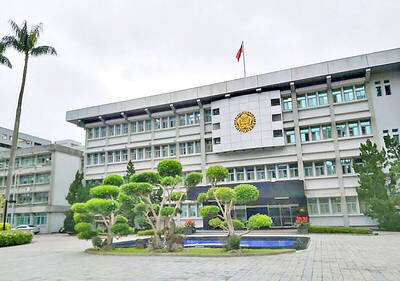The Ministry of Education has earmarked NT$3.61 billion (US$124 million) for bilingual education in all grades before college nationwide over the next two years, with funding sourced from the Forward-looking Infrastructure Development Program, it said yesterday.
The K-12 Education Administration’s budget for next year and 2022 would take up NT$2.47 billion of the existing budget, the ministry said.
The ministry would push for classes to be taught in English, subsidize select subjects for bilingual instruction, and encourage junior colleges and vocational high schools to offer courses to help students improve their English-language skills, Deputy Minister of Education Tsai Ching-hwa (蔡清華) said.
The program is stepping up support for disadvantaged students in rural areas, while also working to increase teachers’ fluency and grasp of English by allocating funds for short-term study abroad programs, Tsai said.
Experts and education groups agree that an effort to make Taiwan a bilingual nation is the right move, but the ball is in the ministry’s court, and it would decide how to effectively implement the policy, he said.
National Chung Hsing University professor Wuu Dong-sing (武東星) said that gradually increasing the number of classes fully taught in English would help Taiwan attract foreign students, adding that this would address the declining number of students pursuing master’s and doctoral degrees in the nation.
This would also help the government meet its deadline to make Taiwan a bilingual nation by 2030, he added.
If a third of elementary-school classes need to be taught in English, then at least half of universities’ courses would need to switch language tracks so that students could benefit, Chihlee University of Technology professor Chen Chao-ming (陳超明) said.
While some universities say they have already been teaching courses entirely in English, it is not necessarily true, he said
The only way to ensure every university is following the policy is to introduce a third-party certification process, he added.
Should the ministry’s policy go forward, the learning gap between rural and urban areas must be addressed, as this policy threatens to widen that disparity, Principals’ Association president Chang Hsin-wu (張信務) said.
How bilingual teachers are prepared, what materials they use and in what environment they are teaching are all critical to the success of the policy, he said.
The ministry is on the right track in promoting English speaking and comprehension practices, National Federation of Teachers’ Unions president Hou Chun-liang (侯俊良) said.
However, pushing for courses to be taught entirely in English at all levels of education before university could affect a student’s will to learn English or the subject matter it is being taught in, Hou added.

The German city of Hamburg on Oct. 14 named a bridge “Kaohsiung-Brucke” after the Taiwanese city of Kaohsiung. The footbridge, formerly known as F566, is to the east of the Speicherstadt, the world’s largest warehouse district, and connects the Dar-es-Salaam-Platz to the Brooktorpromenade near the Port of Hamburg on the Elbe River. Timo Fischer, a Free Democratic Party member of the Hamburg-Mitte District Assembly, in May last year proposed the name change with support from members of the Social Democratic Party and the Christian Democratic Union. Kaohsiung and Hamburg in 1999 inked a sister city agreement, but despite more than a quarter-century of

The Ministry of Foreign Affairs (MOFA) yesterday expressed “grave concerns” after Singaporean Prime Minister Lawrence Wong (黃循財) reiterated the city-state’s opposition to “Taiwanese independence” during a meeting with Chinese Premier Li Qiang (李強). In Singapore on Saturday, Wong and Li discussed cross-strait developments, the Singaporean Ministry of Foreign Affairs said in a statement. “Prime Minister Wong reiterated that Singapore has a clear and consistent ‘one China’ policy and is opposed to Taiwan independence,” it said. MOFA responded that it is an objective fact and a common understanding shared by many that the Republic of China (ROC) is an independent, sovereign nation, with world-leading

Temperatures in northern Taiwan are forecast to reach as high as 30°C today, as an ongoing northeasterly seasonal wind system weakens, the Central Weather Administration (CWA) said. CWA forecaster Tseng Chao-cheng (曾昭誠) said yesterday that with the seasonal wind system weakening, warmer easterly winds would boost the temperature today. Daytime temperatures in northern Taiwan and Yilan County are expected to range from 28°C to 30°C today, up about 3°C from yesterday, Tseng said. According to the CWA, temperature highs in central and southern Taiwan could stay stable. However, the weather is expected to turn cooler starting tonight as the northeasterly wind system strengthens again

The Ministry of Justice Investigation Bureau (MJIB) has been investigating nine shell companies working with Prince Holding Group, and the Taipei District Prosecutors’ Office is seeking further prosecution of alleged criminals, a source said yesterday. The nine companies and three Taiwanese nationals were named by the US Department of the Treasury’s Office of Foreign Assets Control (OFAC) on Oct. 14 as Specially Designated Nationals as a result of a US federal court indictment. Prince Holding founder Chen Zhi (陳志) has been charged with fraud, conspiracy, money laundering and overseeing Prince Holding’s suspected forced-labor camps in Cambodia, the indictment says. Intelligence shared between Taiwan,